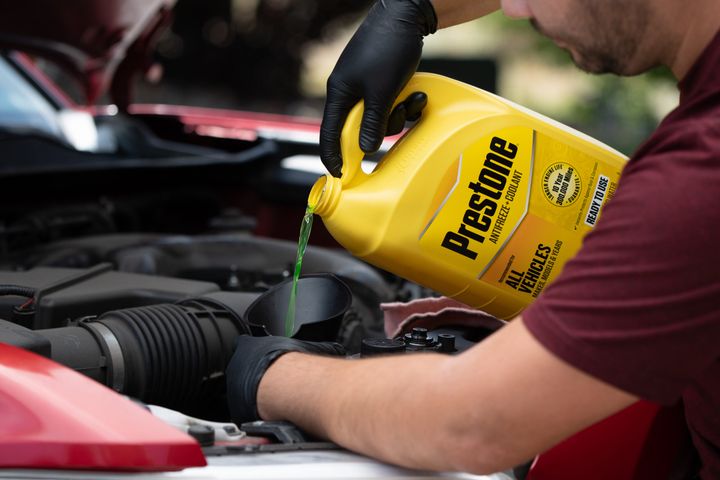


Antifreeze is an essential automotive fluid that plays a vital role in maintaining optimal engine temperatures. By leveraging scientific principles, it ensures reliable thermal regulation across various operating conditions. This comprehensive guide delves into the intricate mechanisms behind antifreeze's protective capabilities, exploring its chemistry, formulation, and advanced functionalities.

Antifreeze's primary function is to prevent the coolant from freezing, even in extreme cold temperatures. This is achieved through freezing point depression.
When antifreeze, typically ethylene glycol or propylene glycol, is added to water, it disrupts the formation of ice crystals by interfering with the hydrogen bonding between water molecules. The higher the antifreeze concentration, the lower the freezing point, providing enhanced freeze protection.
| Antifreeze Concentration | Freezing Point |
|---|---|
| 50/50 mixture | -37°C (-35°F) |
| 30/70 mixture | -55°C (-67°F) |
By adjusting the antifreeze concentration, automotive technicians can fine-tune the freezing point to meet specific operating conditions and climate requirements.
Antifreeze also plays a crucial role in raising the boiling point of the coolant mixture, preventing overheating and excessive pressure buildup.
A 50/50 antifreeze solution boils around 106°C (223°F), significantly higher than pure water's 100°C (212°F) boiling point.
This boiling point elevation prevents the coolant from boiling off during high-temperature operations, ensuring efficient heat transfer and preventing pressure buildup.
Automotive engineers carefully consider factors like engine design, operating conditions, and climate to determine the optimal antifreeze concentration that balances freeze protection and boiling point elevation.
The freezing point depression and boiling point elevation effects of antifreeze are examples of colligative properties, which depend on the concentration of dissolved particles (solutes) in a solvent.
At the molecular level, antifreeze molecules interfere with the formation of ice crystals and alter the vapor pressure of the solution, lowering the freezing point and raising the boiling point, respectively.
By leveraging colligative properties, engineers can fine-tune the thermal regulation capabilities of antifreeze formulations to meet specific performance requirements.
Cooling systems are susceptible to various forms of corrosion, which can degrade metal components and compromise efficiency. Antifreeze formulations include corrosion inhibitor additives to combat specific corrosion mechanisms.
Common inhibitors:
Silicates
Phosphates
Nitrites
Organic acid salts
These additives form protective layers on metal surfaces, neutralize acidic compounds, or act as sacrificial anodes to prevent corrosion.
Effective corrosion inhibition requires a multi-pronged approach, combining the right inhibitor additives with proper coolant maintenance and system design considerations.
The formulation of antifreeze involves balancing various factors and tradeoffs to achieve desired performance characteristics and compatibility with cooling system components.
| Factor | Considerations |
|---|---|
| Glycol Base Selection | Freeze protection capabilities, toxicity concerns, environmental impact |
| Additive Packages | Compatibility with metals, plastics, and elastomers |
| Cost and Concentration | Desired level of protection, performance, and operating conditions |
| Environmental Impact | Biodegradability, environmental persistence |
Automotive manufacturers and service providers must carefully evaluate these factors to ensure optimal performance, cost-effectiveness, and environmental responsibility.
Modern antifreeze formulations often incorporate advanced functionalities to address specific challenges and enhance overall cooling system performance.
Electrical conductivity adjustment for signal transfer or monitoring
Cavitation and aeration suppression to protect components and maintain efficiency
Thermal shock and nucleation resistance for sudden temperature fluctuations
Vapor pressure and azeotropic behavior control for consistent cooling performance
These advanced functionalities demonstrate the continuous innovation in antifreeze formulations to meet the evolving needs of the automotive industry.
Antifreeze is a remarkable automotive fluid that harnesses scientific principles to provide comprehensive protection for vehicle cooling systems. By mastering freezing point depression, boiling point elevation, colligative properties, and corrosion inhibition, antifreeze ensures reliable thermal regulation across a wide range of operating conditions. With careful formulation and consideration of factors such as glycol base selection, additive packages, cost, and environmental impact, antifreeze formulations can be tailored to meet the specific needs of various applications. As automotive technology continues to evolve, the role of antifreeze in enabling efficient and durable cooling systems will remain paramount, driving innovation in advanced functionalities and sustainable formulations.
Antifreeze's primary function is to prevent the coolant from freezing, even in extreme cold temperatures. This is achieved through freezing point depression.
A 50/50 antifreeze solution boils around 106°C (223°F), significantly higher than pure water's 100°C (212°F) boiling point. This boiling point elevation prevents the coolant from boiling off during high-temperature operations.
Colligative properties depend on the concentration of dissolved particles (solutes) in a solvent. Antifreeze molecules interfere with the formation of ice crystals and alter the vapor pressure of the solution, lowering the freezing point and raising the boiling point.
Common corrosion inhibitors in antifreeze include silicates, phosphates, nitrites, and organic acid salts. These additives form protective layers, neutralize acidic compounds, or act as sacrificial anodes to prevent corrosion.
Factors considered in antifreeze formulation include glycol base selection, additive packages, cost and concentration, and environmental impact. These factors are balanced to achieve desired performance, compatibility, and environmental responsibility.
Advanced functionalities of modern antifreeze formulations include electrical conductivity adjustment, cavitation and aeration suppression, thermal shock and nucleation resistance, and vapor pressure and azeotropic behavior control.
Antifreeze disrupts the formation of ice crystals by interfering with the hydrogen bonding between water molecules. The higher the antifreeze concentration, the lower the freezing point, providing enhanced freeze protection.
Antifreeze plays a crucial role in raising the boiling point of the coolant mixture, preventing overheating and excessive pressure buildup. This boiling point elevation ensures efficient heat transfer and prevents pressure buildup.
The common glycol bases used in antifreeze formulations are ethylene glycol and propylene glycol. These glycols are responsible for the freezing point depression and boiling point elevation effects.
Corrosion inhibitors in antifreeze protect cooling system components by forming protective layers on metal surfaces, neutralizing acidic compounds, or acting as sacrificial anodes to prevent corrosion of metals.

Miguel started tinkering with car radios as a teenager, fascinated by the intricate dance of wires and circuits. This passion led him to pursue a career as an automotive electrician. For the past 10 years, Miguel has tackled everything from flickering headlights to mysterious electrical gremlins. He thrives on troubleshooting electrical problems and enjoys sharing his knowledge to empower car owners to understand their vehicles better.







